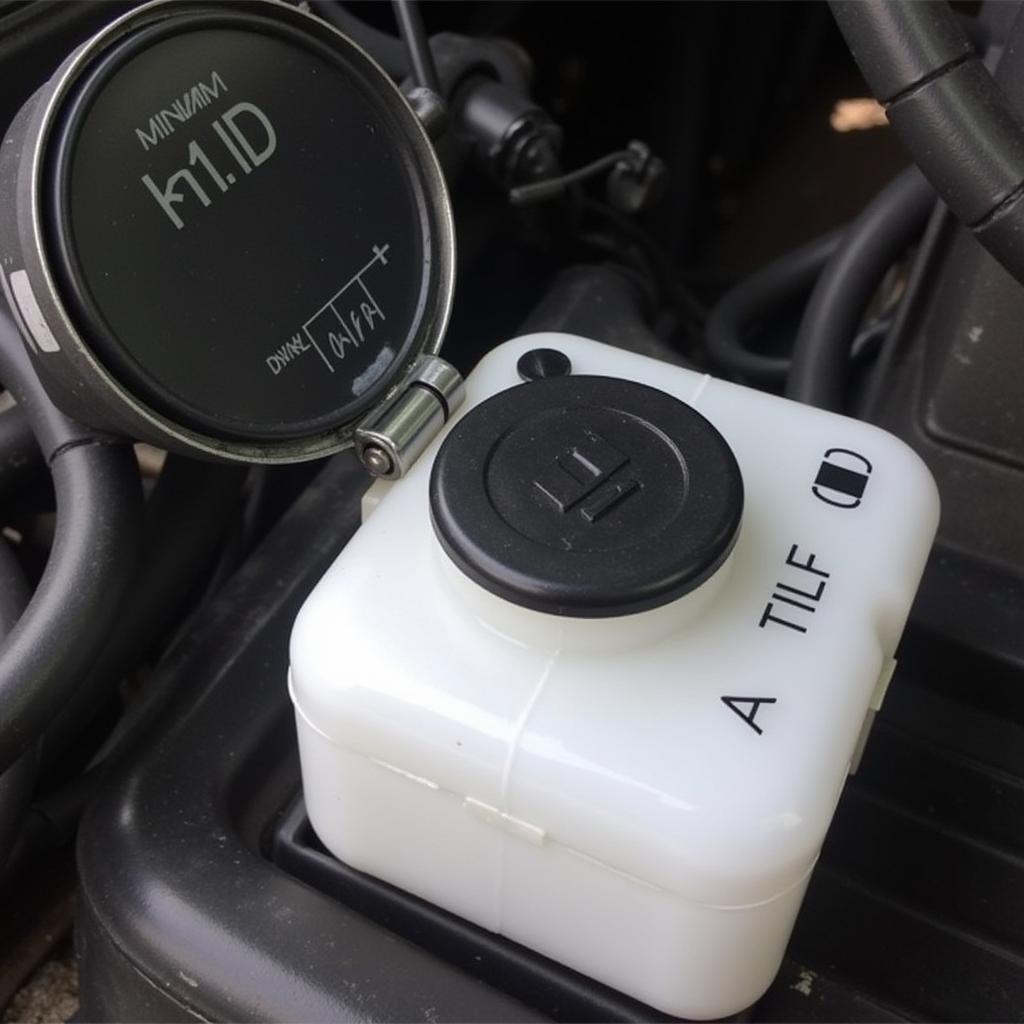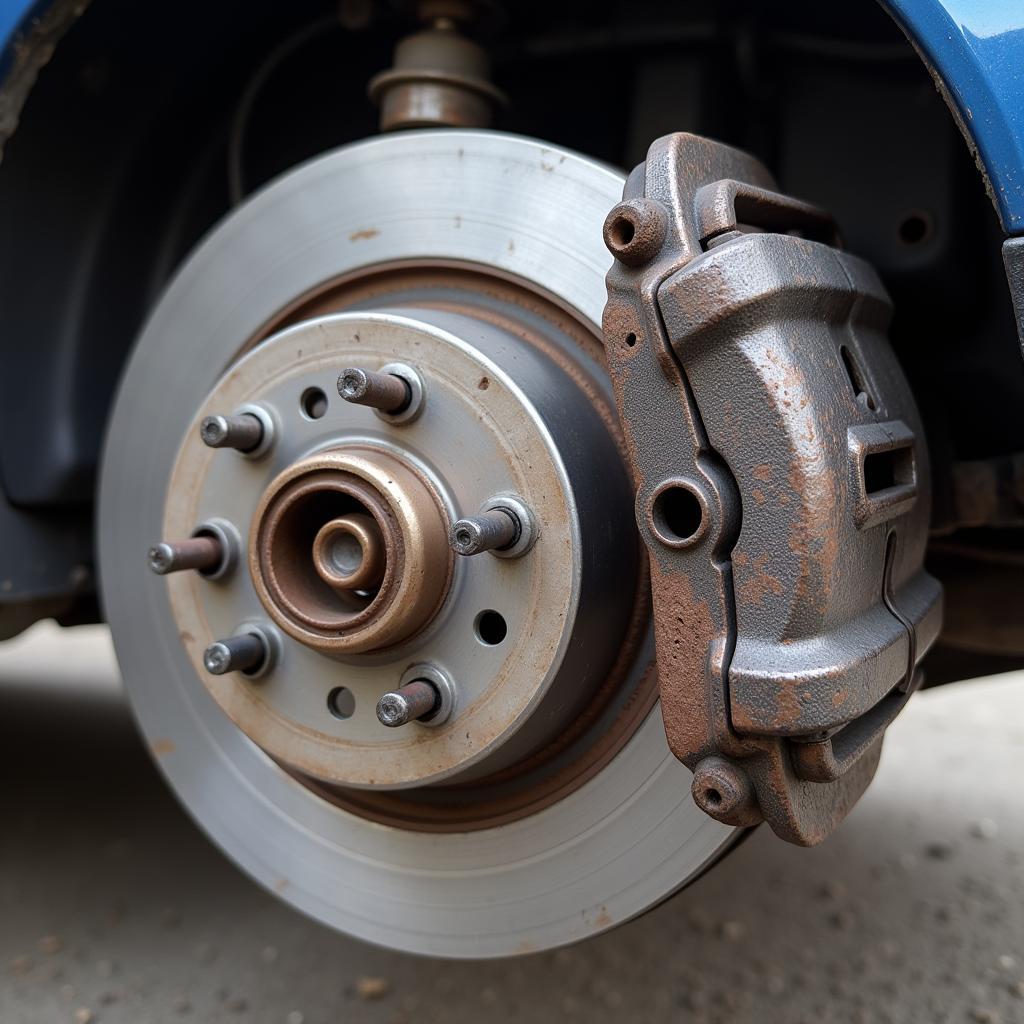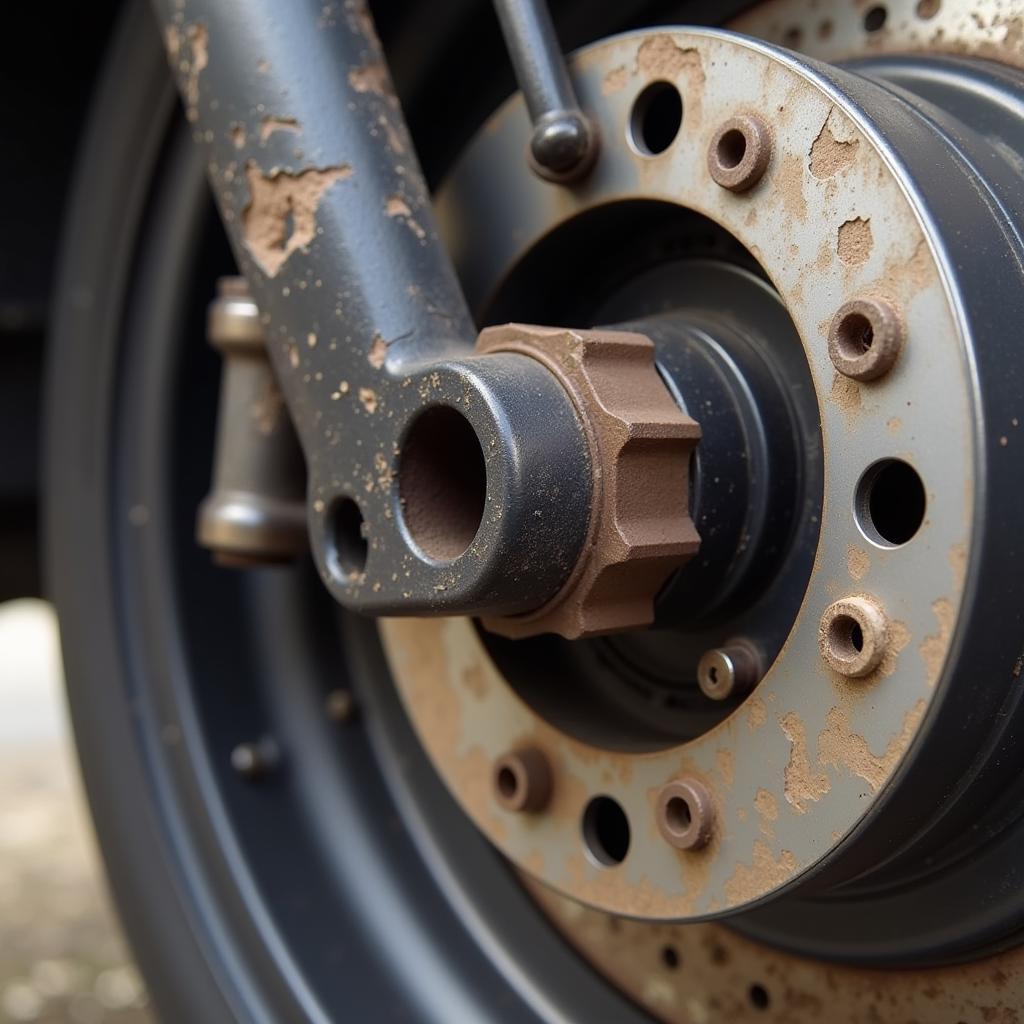The brake warning light on your 2002 Volkswagen Jetta is an important safety feature that shouldn’t be ignored. It’s designed to alert you to potential issues within your car’s braking system. Whether it’s a fleeting flicker or a persistent glow, understanding the reasons behind this warning light is crucial for your safety and the vehicle’s well-being.
In this comprehensive guide, we’ll delve into the common causes behind a 2002 VW Jetta brake warning light, potential solutions, and when it’s best to seek professional help.
Common Causes of a 2002 VW Jetta Brake Warning Light
Several factors can trigger the brake warning light on your 2002 Jetta. Here are some of the most frequent culprits:
1. Low Brake Fluid Level
The most common culprit behind an illuminated brake warning light is a low brake fluid level. Brake fluid plays a vital role in transmitting force from your foot on the brake pedal to the brake calipers at each wheel. Over time, brake fluid levels naturally decrease as brake pads wear down. However, a sudden drop in brake fluid often signifies a leak.
What to do: Check the brake fluid level in the reservoir under the hood. If it’s low, add the appropriate DOT 4 brake fluid. However, if you notice consistently low brake fluid levels, it’s crucial to have your braking system inspected for leaks.
2. Worn Brake Pads
Your Jetta’s brake pads are designed with wear indicators. As the friction material wears down, these indicators eventually contact the brake rotor, triggering the brake warning light. This mechanism is a clear sign that your brake pads are due for replacement.
What to do: Inspect your brake pads for wear. If they appear thin or you’re unsure, consult a mechanic. Driving with worn brake pads not only compromises braking performance but can also damage the rotors, leading to costlier repairs.
3. Faulty Brake Pad Wear Sensor
Although less common, a malfunctioning brake pad wear sensor can also trigger the warning light. These sensors, usually a simple wire embedded within the brake pad, can sometimes break or become disconnected, falsely indicating worn pads.
What to do: If you suspect a faulty sensor, a mechanic can diagnose the issue using a diagnostic tool. This tool can read the sensor’s signal and determine if it’s functioning correctly.
4. ABS Issues
Your 2002 VW Jetta is equipped with an Anti-lock Braking System (ABS). If the ABS module encounters a problem, it can trigger the brake warning light in conjunction with the ABS warning light. Issues with the ABS system can range from faulty wheel speed sensors to problems within the ABS module itself.
What to do: Because the ABS system is electronically controlled, diagnosing issues often requires specialized diagnostic tools. If you suspect a problem with your ABS, it’s best to consult a qualified mechanic.
 2002 VW Jetta Brake Fluid Reservoir
2002 VW Jetta Brake Fluid Reservoir
5. Hydraulic System Problems
Your car’s braking system is hydraulic, relying on pressure created by the brake fluid to operate. Air in the brake lines, a damaged brake hose, or a failing master cylinder can disrupt this pressure, leading to a loss of braking power and an illuminated warning light.
What to do: Diagnosing and repairing hydraulic system problems require specialized knowledge and tools. It’s strongly recommended to seek help from a qualified mechanic if you suspect issues with this part of your braking system.
When to Seek Professional Help
While some brake warning light issues may seem minor, it’s crucial to remember that your car’s braking system is critical for your safety. If you encounter any of the following situations, it’s essential to seek professional help:
-
You’re uncomfortable diagnosing the issue yourself. Working on brakes requires mechanical knowledge. If you’re unsure, a professional mechanic can accurately diagnose the problem and ensure a proper repair.
-
The brake pedal feels soft or spongy. This often indicates air in the brake lines, a serious issue that requires immediate attention.
-
You hear unusual noises when braking. Grinding, squealing, or clunking sounds when applying the brakes can indicate severe brake pad wear or other problems that need addressing immediately.
-
Your car pulls to one side when braking. This can indicate a problem with the brake calipers, a brake hose, or uneven brake pad wear, all of which need professional attention.
 Worn Brake Pads on a 2002 VW Jetta
Worn Brake Pads on a 2002 VW Jetta
Tips for Maintaining Your VW Jetta’s Braking System
Regular maintenance is key to preventing brake problems and ensuring the longevity of your car’s braking system:
- Regularly check your brake fluid level. Consult your owner’s manual for the recommended interval, typically every 3,000 miles or with each oil change.
- Inspect your brake pads regularly. Depending on your driving habits, brake pads typically last between 30,000 to 70,000 miles.
- Flush your brake fluid every 2 years or as recommended by your mechanic. This helps prevent corrosion within the system and maintains optimal braking performance.
- Avoid riding your brakes. Anticipate stops and coast whenever possible. Excessive braking generates heat, leading to faster brake pad wear.
Conclusion
The brake warning light on your 2002 VW Jetta is a crucial safety feature designed to alert you to potential braking system problems. Addressing the root cause of an illuminated brake warning light promptly is essential for ensuring your safety and preventing further damage to your vehicle. While some fixes may be straightforward, such as adding brake fluid, others require the expertise of a qualified mechanic. Remember, a well-maintained braking system is fundamental to safe and reliable driving.
FAQs
1. Can I drive my 2002 VW Jetta with the brake warning light on?
It’s not recommended. Driving with an illuminated brake warning light can be dangerous as it indicates a potential issue with your braking system.
2. How much does it cost to fix a brake warning light on a 2002 VW Jetta?
The repair cost depends on the underlying cause. A simple brake fluid top-off can cost as little as $10, while more complex repairs like replacing a master cylinder can range from $300 to $700.
3. How often should I get my brakes checked?
It’s good practice to have your brakes inspected at least once a year or every 12,000 miles, or more frequently if you notice any issues or hear unusual noises.
4. What type of brake fluid does a 2002 VW Jetta use?
Your 2002 Jetta requires DOT 4 brake fluid. Using the wrong type of brake fluid can damage your braking system. Always consult your owner’s manual or a trusted mechanic to confirm compatibility.
5. Can I replace my VW Jetta’s brake pads myself?
While it’s possible to replace brake pads yourself if you have the necessary tools and mechanical knowledge, it’s recommended to have this service performed by a qualified mechanic to ensure proper installation and safety.

